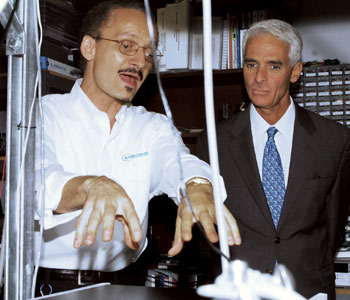Policy Matters
Science and Policy: Not Mutually Exclusive
As scientists work in labs across the United States, policymakers pass laws, rules and regulations in the chambers of the U.S. Capitol. For many people, these two worlds seem completely separate. The truth is, science and policy are not mutually exclusive; in fact, they are heavily dependent on each other.
 Peter Delfyett (left) explains his research at his lab at CREOL to Florida Gov. Charlie Crist during a tour of UCF’s Florida Photonics Center.
Peter Delfyett (left) explains his research at his lab at CREOL to Florida Gov. Charlie Crist during a tour of UCF’s Florida Photonics Center.
You may be surprised at how many of the myriad technologies available to us today were a direct result of U.S. government-funded research and development. The graduate student who developed Google received National Science Foundation funding. Researchers at the Defense Advanced Research Projects Agency (DARPA) at the U.S. Department of Defense developed the Saturn V rocket, which launched the Apollo missions to the moon. Research done at the U.S. Department of Energy’s Office of Science aided in the creation of magnetic resonance imaging (MRI), a key technique in medical diagnostics. And the list goes on.
…Log in or become a member to view the full text of this article.
This article may be available for purchase via the search at Optica Publishing Group.
Optica Members get the full text of Optics & Photonics News, plus a variety of other member benefits.
